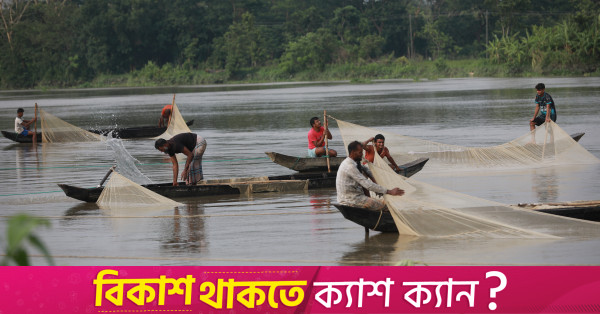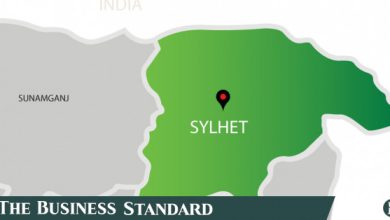Pollution killing mother carp fish in Halda river: Experts


Photo: Mohammad Minhaj Uddin/TBS
“>
Photo: Mohammad Minhaj Uddin/TBS
The deaths of two dolphins and six mother carp fish in Chattogram’s Halda River in the past 12 days have sparked concerns among fish farmers and researchers who attribute these incidents to rising pollution.
Experts warn that pollution, exacerbated by the unchecked disposal of household and industrial waste, poses a growing threat to the biodiversity of the Halda River, which serves as the sole natural breeding ground for carp fish in the subcontinent.
“We found the water quality of the river’s main flow good during recent sampling. However, the water quality of the canals joining the river is very poor as they carry waste from industries and households in the locality,” said Dr Manzoorul Kibria, chairman of the Department of Zoology at the University of Chittagong and coordinator of the Halda River Research Laboratory.
“The toxic waste is altering various physico-chemical properties of the water in the Halda aquatic ecosystem, polluting the environment. It is necessary to identify and take measures against the factories dumping waste into the Halda to restore the river’s health,” he told TBS.
According to the Department of Fisheries and Chittagong University’s Halda River Research Laboratory, 43 dolphins and 30 Rui and Katla mother fish have been found dead in the past five years. Over the last eighteen months, there were no reported fish deaths, but recently, a sudden surge in deceased mother fish floating in the river has emerged.
Responding swiftly, the Department of Fisheries and the Department of Environment have each established two separate committees to probe the cause of these fish deaths, starting on 1 July.
The deceased fish will undergo autopsies at the Halda Research Laboratory, and samples have been dispatched to the Criminal Investigation Department (CID) lab for forensic examination.
As a single river, Halda contributes the most to the national economy. The growth rate of carp in the river is much higher than in other sources of fish. Therefore, traders from all over the country come to Chattogram to buy Halda fry.
Halda contributes to the economy in four phases within the country’s fisheries sector, from the egg stage to the dining table.
According to researchers, thunderstorms during full moon nights between the Bangla months of Chaitra and Ashar can trigger flash floods in the Halda River. Under favourable temperatures, carp typically spawn during this period. Motherfish typically lay their eggs in the Halda River from mid-April to June.
Manzoorul Kibria said, “Because of unfavourable weather conditions, the mother fish did not fully release eggs this season. If the eggs in the stomach cannot be released, they are absorbed by the mother fish, making her physically weak and stressed.”
“This susceptibility allows bacteria to infect the fish easily. With the increased pollution in the river, bacterial transmission is more common. I believe this is why the mother fish are dying,” he said.
Photo: TBS
“>
Photo: TBS
Govt oversight to prevent pollution declined
Researchers and residents along the Halda River said industrial and household wastes are directly entering the Halda River through five canals and two beels (large waterbodies) connected to it.
Aminul Islam Munna, a local activist, said, “Waste from industries, households, and tanneries flows directly into the river via Khandakia and Katakhali canals. Poultry waste also contaminates the river. Since early June, these canals have been filled with black, foul-smelling water mixed with oil and toxic waste.”
According to the Integrated Development Foundation, there were 28 anti-pollution drives along the Halda River during the first six months of 2022, followed by 21 in the subsequent six months. In 2023, 15 operations were conducted in the first half of the year and 10 in the latter half. Only 10 operations were carried out in the first six months of 2024.
Kamal Saudagar, owner of the Halda Fish Production Centre hatchery in Hathazari, told TBS, “Administrative supervision needs to be intensified. To catch small fish, some unscrupulous individuals are using poison, killing small fish which are then consumed by larger fish.”
Hathazari Upazila Nirbahi Officer ABM Mosiuzzaman told TBS, “We have been collaborating with all agencies for the past three days. A comprehensive report with recommendations to reduce pollution will be submitted to the district administration.”
Manzoorul Kibria said, “The Department of Environment, City Corporation, and Fisheries Department must collaborate effectively to curb pollution. Factories responsible for pollution must be identified and strict actions taken against them.”




